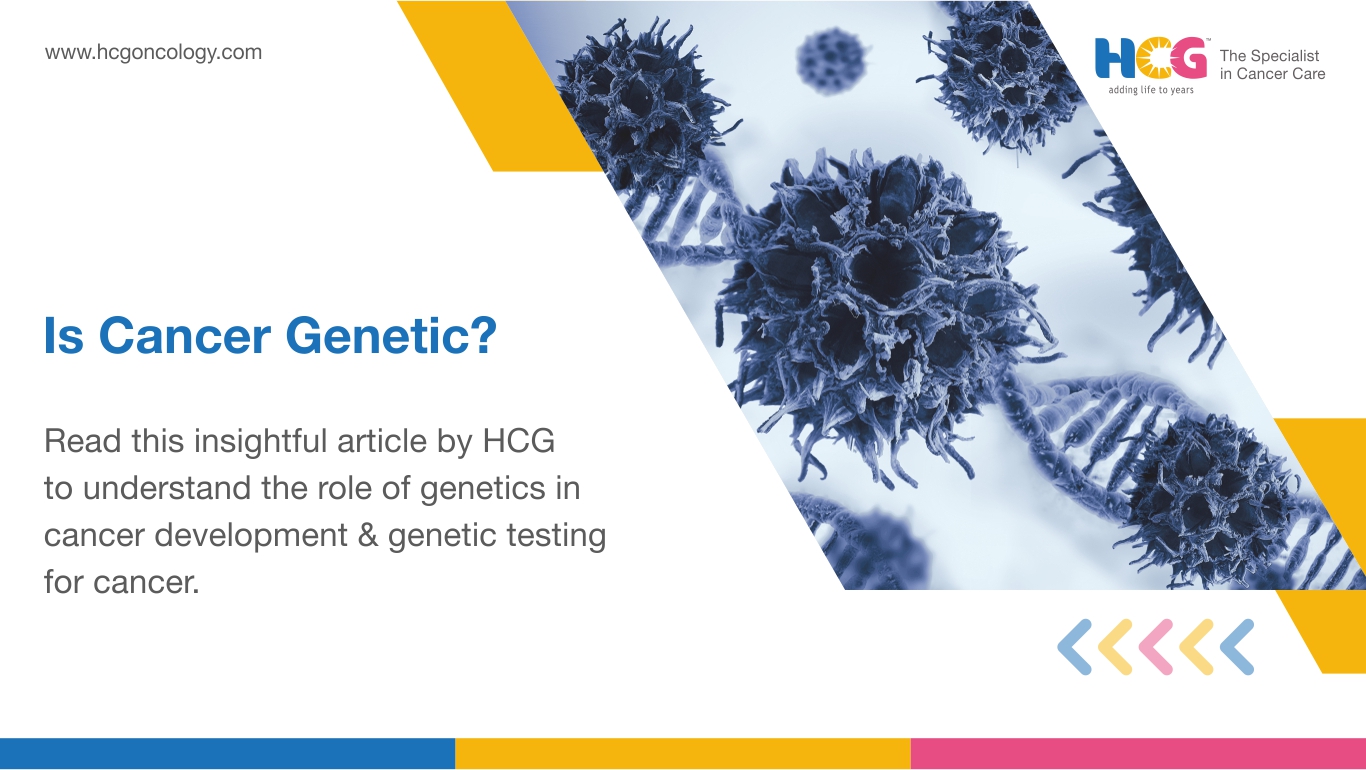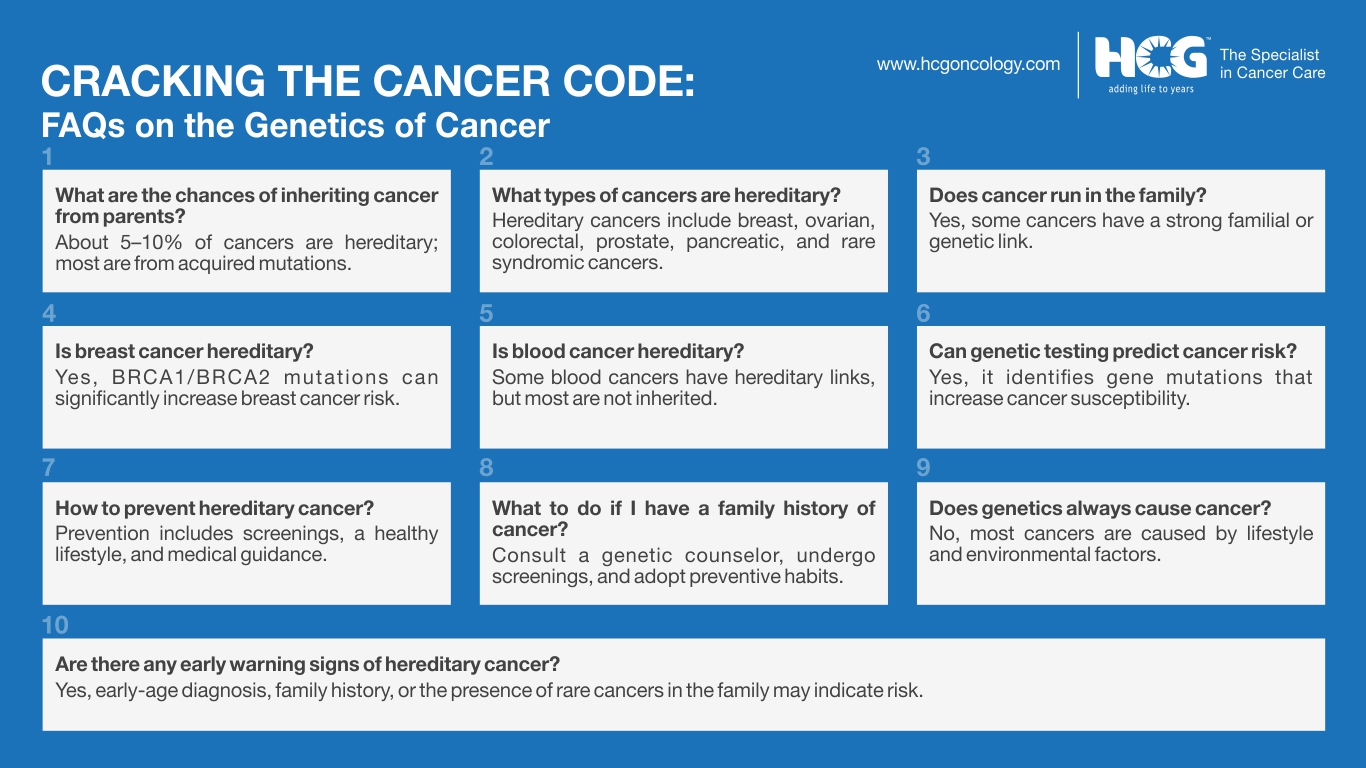
02 Dec, 2025
Feel free to reach out to us.

02 Dec, 2025
.jpg)
This article is medically reviewed by Dr. Shirish Alurkar, Consultant - Medical Oncology, HCG Aastha Cancer Centre, Ahmedabad.
It is a condition in which cells divide and spread uncontrollably and spread to other organs. These cancer cells interfere with the normal functioning of the organs. If left untreated, the condition may result in death.
In this blog article, we will be discussing the key aspects of genetics and cancer and addressing questions such as, “Is cancer a genetic disorder?”
“How is cancer related to genetics?” and “Can cancer be inherited from parents?”
Cancer is a genetic disease. Elaborating further, cancer occurs when there are undesirable mutations in the genes of different cells in the body. However, a lot of factors contribute to these mutations, and they include lifestyle factors, environmental factors, and hereditary factors.
About 5 to 10% of cases of cancer are associated with genetic defects, and the majority of cancer cases are linked to lifestyle and environmental factors.
The lifestyle factors include smoking, alcohol consumption, unhealthy diet, physical inactivity, obesity, and stress. The environmental factors include environmental pollutants and sun exposure.
Additional Reading: 7 Best Ways to Reduce Your Cancer Risk - HCG
In recent years, we have made significant progress in the characterization and identification of the susceptibility genes in cancer development.
Our understanding of the genetic mechanisms involved in cancer development has improved remarkably. We have carried out extensive genetic analysis and assessment of environmental factors to understand why only certain individuals who are exposed to particular carcinogens or mutations develop cancer and not all.
These analyses have also explained the varying treatment response rates in different cancer patients. Today, we also have an in-depth understanding of varying rates of cancer development among groups exposed to similar environments, including families.
Several different types of genes are involved in the development of cancers. These include:
1. Oncogenes: The function of proto-oncogenes is to instruct the cells to divide and multiply. Certain mutations can turn proto-oncogenes into oncogenes, which cause cell division to become abnormal, wherein the cells divide uncontrollably, resulting in tumor formation.
2. Tumor Suppressor Genes (Anti-Oncogenes): These genes encode proteins that regulate cell growth and division. However, when these genes undergo mutations, they cause the cells to divide uncontrollably, resulting in cancer.
3. DNA Repair Genes: Cell DNA is at risk for damage due to exposure to various environmental conditions and other factors, which could lead to cancer. However, the DNA repair genes in the cells help repair the damaged DNA.
Mutations in these genes may reduce the ability of cells to repair themselves and increase cancer risk. Studies have reported the role of damaged DNA repair genes in bowel cancer.
4. Self-Destruction Genes: The self-destruction of old or damaged cells is known as apoptosis. Self-destruction genes control this process. Cells die when there is damage in their DNA that increases the risk of cancer. However, mutations in these genes reduce the ability of apoptosis and increase the risk of cancer.
Family cancer syndromes are inherited disorders that are caused by genetic mutations. The presence of these disorders increases the risk of cancer development.
Some of the conditions that enhance the risk of cancer are hereditary breast and ovarian cancer syndrome, Li-Fraumeni syndrome, Lynch syndrome, and Cowden syndrome.
Familial cancer syndromes are suspected when several relatives have the same rare cancer, individuals have multiple cancer types, or the occurrence of cancer is at a younger age.
Cancer in immediate relatives, such as parents or siblings, indicates a higher inherited risk than cancer among distant relatives. The risk of familial cancer syndromes should be evaluated by analyzing the age, family history, and gene analysis.
About 5 to 10% of all cancers are hereditary. They are caused by inheriting a mutated "cancer susceptibility gene" from one parent while receiving a functional copy from the other.
The functional gene regulates the normal growth of the cell. However, when there is a mutation in the functional gene, the cell may divide uncontrollably, leading to cancer.
Cancer is genetic, as it is a disorder that arises due to the changes in the genes that control the growth and multiplication of various cells in the body.
The cancer-related mutation in the gene of an individual may occur during their lifetime, rather than being passed from their parents. These mutations are known as somatic mutations. They may occur because of individual-environmental interactions, such as alcohol consumption, smoking, and exposure to radiation and toxic chemicals. They may also occur because of errors during cell division.
The DNA of cells contains important information, one of which is the speed and control over cell division. Certain substances, such as chemicals, harmful radiation, and other factors, change this information.
This change in the DNA is known as a mutation. When the gene carrying information for cell division regulation is deleted or changed, cells divide uncontrollably and spread to other organs. This uncontrolled division of cells leads to the formation of a mass called a tumor and eventually cancer.
Genetic mutations may be inherited or acquired. When the genetic mutations are inherited, the abnormal gene is passed from a parent and increases the risk of developing cancer early in life.
Acquired mutations are more common and may occur during a person's life because of environmental factors or during cell division. Some mechanisms through which gene mutations occur are insertion, duplication, deletion, translocation, and inversion.
Inherited cancers are those that increase the risk of cancer in the immediate relatives and run in families. Commonly observed types of cancer with significant hereditary associations are hereditary breast and ovarian cancer syndrome, thyroid cancer, endometrial cancer, sarcoma, and colorectal cancer.
Genetic testing helps oncologists assess mutations in genes linked to cancer. Predictive tests evaluate inherited mutations, like BRCA1/BRCA2. Gene testing helps individuals find out if they have an increased risk of developing certain cancers.
Testing benefits those with strong family histories, early diagnoses, or rare cancers. Genetic counseling helps evaluate risks, test results, and future courses of action.

Cancer is a condition that develops because of uncontrolled cell growth caused by genetic mutations. While 5-10% of cases are hereditary, environmental factors like smoking and pollution also play a role in causing acquired mutations.
Mutations in oncogenes, tumor suppressor genes, DNA repair genes, and self-destruction genes may lead to cancer development. Genetic testing helps identify individuals at higher risk.
.jpg)
Dr. Shirish Alurkar
Consultant - Medical Oncology
MBBS, MD (Internal Medicine), ECMO
Dr. Shirish S. Alurkar is a senior medical oncologist with a wealth of knowledge and experience. He is available for consultations at HCG Aastha Cancer Centre, a leading cancer hospital in Ahmedabad. With almost four decades of experience, Dr. Shirish S. Alurkar's primary interest lies in managing GI cancers, urological cancers, and lung cancers. He extends his expertise to breast cancer management and cancer biology as well. He has a special interest in the field of molecular and precision oncology and conducting clinical trials. Dr. Alurkar is one of the first medical oncologists to start a private practice in Gujarat.
To book an appointment with Dr. Shirish Alurkar, please click here.